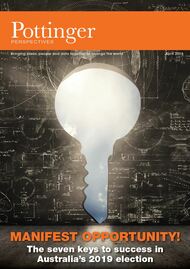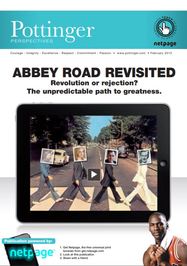 Australia is one of the strongest economies in the world. We are rich not simply in our natural resources, but also in our magnificent environment, pristine agricultural supply chain, extraordinary indigenous heritage and resourceful and creative people. Australians deserve much better than an age of ignorance. We need leaders who put innovation, entrepreneurship and long-term thinking ahead of sound-bite opportunism – leaders who trust in independent analysis and objective decision-making, not party-political rhetoric. Our editorial provides further background (click the image above or here). We also invite you to browse through the Pottinger Manifesto here, and add your voice to our movement to help deliver an even stronger Australia. If you like what we're saying, please share so that our collective message is amplified as loudly as possible!  How many record labels rejected The Beatles? How many publishers said ’no’ to Harry Potter? If the next Facebook walked into the Facebook boardroom, would Mark Zuckerburg and colleagues invest in the new pretender? Or would they think that the company was simply too speculative, too different, too risky? Remember, eight years later the original Facebook listed at a $100 billion valuation, having added an average of over 300,000 monthly active users a day since its launch in 2004. Revolutionary successes are by definition easy to see in hindsight, but how do you spot a business that will define a generation before it becomes great? Around the world, opportunities for dramatic and revolutionary change walk in and out of meeting rooms every day. Projects that offer a billion dollars of upside opportunity, with genuinely limited downside risks, are quietly rejected. Often the risks appear too great, or the vision is too far removed from where the perceived opportunities lie. Meanwhile, some CEOs and leadership teams are being criticised for a lack of boldness. With the benefit of hindsight, some business decisions that maintained the status quo have destroyed tens of billions of dollars of value. But, over the near term, evolution feels much safer than revolution. There are, of course, many ideas that succeeded in attracting investment, and then have slipped quietly into history without leaving any legacy. But how many truly great ideas or businesses or stories or bands have gone undiscovered, because they were too new, too different, or too far ahead of their time to resonate with those who had the opportunity to support them? The Fab Four, JK Rowling and Walt Disney all succeeded despite great scepticism, but this was down to a very small number of individuals who decided to back their judgement and try something completely new. Read on here... PS: Since this article was written, the Netpage technology was decommissioned, so you can no longer experience the excitement of print media that is truly interactive... For some of the lessons we've learned from this and the many other start-ups we've worked with, see "Entrepreneur or Gonetrepreneur"  Great companies stand out from the rest. They are leaders who drive the direction of entire industry sectors. They are more highly valued than their competitors. Their customers embrace them and loyally support them through thick and thin. And every management team wants their company to be seen as one of the greats. But what does it really take to be a great company? The management books written on great companies refer to “competitive advantage”, “sources of differentiation” and “customer centricity.” The problem is that this jargon refers to ends, not means. Competitive advantage is not an ingredient of success, it is an outcome of the process of achieving market leadership. True leaders have several points of differentiation, but that description provides no insight into how a company goes about differentiating itself. Being “close to the customer” is a feature of great organisations, but what did they actually do to become customer centric? Read on here... or watch the video below! |
Pottinger PerspectivesOur take on issues that are changing the world, and how you can make the most of uncertainty Categories
All
|
|
We pay respect to Traditional Custodians and First Nations peoples everywhere, including the Gadigal People of the Eora Nation and the Lenape
|

 RSS Feed
RSS Feed